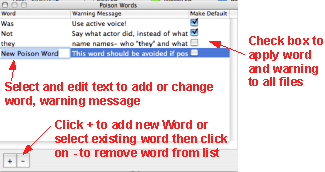POISON WORD TABLE
Certain words in Event Blocks "poison" a description or explanation of what happened,
by leaving the users of your work confused or unclear and therefore inclined to
be defensive, argumentative, or at worst combative about what happened. Be sure to have
a very good reason for using such words if you feel you must. A list with examples of posion words is shown below.
Investigation Catalyst issues warnings and hints before accepting Poison Words in Event Blocks.
"Was" and "not" are default words that will be flagged if typed during data entry in the New Event Block Panel or in the Event Block Inspector Panel. The table of poison words currently flagged can be viewed in the Poison Word panel. Additional words and warning messages or instructions can be added to the table ,or deleted, as follows:
Open Tools> Poison Words.
The current Poison Words panel, with the current active word and warning messages table is displayed.
To edit existing word or warning messages to the table,- select word or message
- edit text
To add a word and warning message to the list, - click on the + box in the lower left corner of the panel,
-
aelect the default text that appears and replace with desired word and message. Warning message may contain up to 200 characters.
To delete a word and message, - select word to delete
- click on - box in lower left corner of panel
To set word as default in all files, - select word
- click on box in default column
.
The following is a list of examples of poison words, because they introduce ambiguity or abstractions into Event Blocks and descriptions of processes.
| Category |
Examples |
Explanation |
| Conjunctions |
and, or but |
prevents placement under single start time and logic testing of
EBs. Separate into two entries at the conjunction. |
| Pronoun |
he, she, you, it, they, them, |
prevents placement on a named actor row; also prevents users from
visualizing what happened; masks behaviors of individuals, indicates investigation
problem. Enter individual names, ID symbols or other unique identifiers. |
| Plural nouns |
crowd, crew, firefighters, workmen |
prevents placement on a name actor row, and logic testing of
actions; also prevents users from visualizing what happened. Track individual
actors. |
| Allegations |
did not, failed to, should have |
interest is in what person or object did and why they did it;
allegations must be accompanied with proofs, and belong in analyses. |
| Opinion adjectives |
improperly, inadequately, incorrectly, badly |
opinions, or judgments about behavior belong in analyses rather
than factual descriptions of what happened. Do not use. |
| Opinion verbs |
violated, should have, erred, misjudged, ignored |
opinions, or judgments about behavior belong in analyses rather than
factual descriptions of what happened. Avoid in descriptions; if not known, say so. |
| Passive voice verbs |
was, were |
passive voice masks who did the action, and often masks lack of
understanding of what happened, investigation problem. Use active voice. |
|
|
